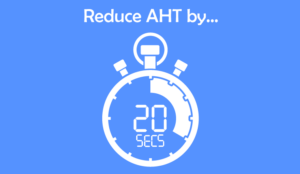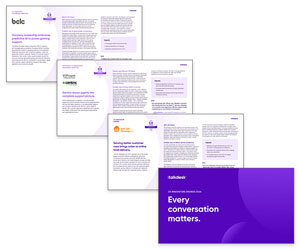Carolyn Blunt explains how advisors can take better control of customer calls – and reduce Average Handling Time (AHT).
Do you find that sometimes callers go off on a tangent? Or are you concerned that your calls always seem to take longer than everyone else’s?
I’ve spent fifteen years helping front-line advisors to keep calls on track without using any harsh phrases that break rapport or annoy customers.
This means I totally ban the use of:
‘If I can just stop you there’
And: ‘If I can just say something’
Or: ‘If you’ll let me finish’
These are hideous phrases that will cause calls to escalate and take even longer.
Instead. listen to the customer, really try to listen to them from your heart not just your head.
This means trying to feel how they feel.
What is most important to them right now in this moment?
Often when customers are going on and on they are often trying to make sure you really, really get the point. You might think you get the point, but do you? That is… From where they are standing?
The sooner you can ‘get it’ and genuinely show them that you ‘get it’, the less likely they are to feel the need to keep trying to make you see it.
So here are some quick tips to get there:
1. Repeat back to them what you have heard
Repeat back to them what you have heard, using their language and expressing empathy, then focus on the solution.
For example: if the customer said, “I’m really disappointed that you have not kept your word and delivered the item when you said you would.”
Then you will say, “I understand your disappointment, Mrs Smith. I feel disappointed about it too. I want to put this right for you. Let’s look at when would be an ideal time to get it to you.”
Don’t get defensive. If your first thought reading that was ‘it wasn’t ME personally that didn’t keep my word’, then you are missing the point.
The customer just sees your organisation as YOU – and you are representing your organisation. So don’t sweat the small stuff. Rise above it. Even if you bite back that resentment, it will still leak out in your voice tone. Grab a stress ball and buckle up. This is the roller coaster of contact centre life and the next call could be hilarious. It’s just the luck of the draw.
2. Pay attention to the customer’s emotive words
Write them down on your jotter pad.
(Everyone still needs a scribble pad on their desk, I don’t care how advanced technology is! It helps you to capture key points before you cleanse them and type them into the system – otherwise the systems would be clogged with all sorts of ramblings.)
Never misinterpret the customer’s emotions or give them your own labels.
For example: if the customer is complaining and you say, “I understand you are upset, Mr Jones”, when Mr Jones hasn’t articulated it as ‘upset’, then be prepared for Mr Jones to yell at you ,“I’m NOT upset, I’m ANGRY!”
And now you’re probably feeling upset AND angry and so the whole thing goes downhill.
3. Bring them back on track sooner rather than later
If you started a quick chat about the weather, but it’s now gone on for 5 minutes, with the caller telling you all about their camping trip being rained off last weekend, then it’s gone too far. So remember, the person asking the questions controls the call.
Wait until they pause for breath and slot in a bridging phrase, followed by a question as quick as a flash and do not pause:
For example:
“Wow, I feel for you, that doesn’t sound like much fun, so before I take up any more of your time today, Mrs Smith, can I ask you to confirm your date of birth/postcode/preferred delivery date.”
OR
“I’m not much of a camper myself, so, Mrs Smith, I just need to ask one more quick thing before we move on…”
4. Be aware of your own communication style and energy levels
If you are quite an extroverted person and you find you feel more energetic earlier in the day, you might find that your calls take longer in the mornings because you are at your most chatty.
Think about how much you might be adding to the talk time. It will be with the best of intentions; you are trying to take super good care of the caller and ensure all their needs are fully met, but you are possibly making life harder for yourself.
I see this a lot with overly enthusiastic new starters and know-it-all long timers. The solution here is to ask to listen to some calls that are whipped through with maximum efficiency. This doesn’t mean short changing a caller, but the best agents match the caller’s needs perfectly, no more, no less.
5. Ask the caller if they need to know something – before going into detail
Remember, too much information can be confusing, so ask the caller if they want or need to know something before you launch into a detailed explanation or description.

Carolyn Blunt
Knowing when to stop is often a sign of confidence. Those that feel the need to show off new-found knowledge can be at risk of giving unnecessary information – so don’t fall into that trap!
About the author: Carolyn Blunt is the lead contact centre consultant with Real Results. Carolyn has 15 years’ industry expertise and is a regular contributor to Call Centre Helper webinars and articles.
Want to book a Balance Training course for your contact centre? Here’s the course outline.
Author: Megan Jones
Published On: 22nd Jun 2016 - Last modified: 13th Jan 2025
Read more about - Customer Service Strategy, Average Handling Time (AHT), Call Handling, Carolyn Blunt, CX





















Good ideas.
Very useful info, thank you.